Sociology Essay: Analyzing Neoliberalism's Role in Global Challenges
VerifiedAdded on 2022/09/30
|9
|2197
|36
Essay
AI Summary
This sociology essay provides a comprehensive analysis of neoliberalism and its multifaceted impacts on global challenges. The essay begins by defining neoliberalism and its core tenets, including market principles, privatization, and deregulation. It then delves into a detailed discussion of the political, economic, and social consequences of neoliberal policies, such as increased wealth disparity, market manipulation, and the rise of economic instability, as evidenced by the 2008 financial crisis. The essay explores the effects of neoliberalism on various sectors, including healthcare, and highlights the resulting inequalities. Furthermore, the essay examines the historical context of neoliberalism, tracing its development from post-war economic strategies to its current manifestations. Finally, it concludes by suggesting alternative policies and strategies to mitigate the negative effects of neoliberalism and promote a more equitable and sustainable economic model. The essay uses several academic sources to support its arguments and provide a critical perspective on the subject.
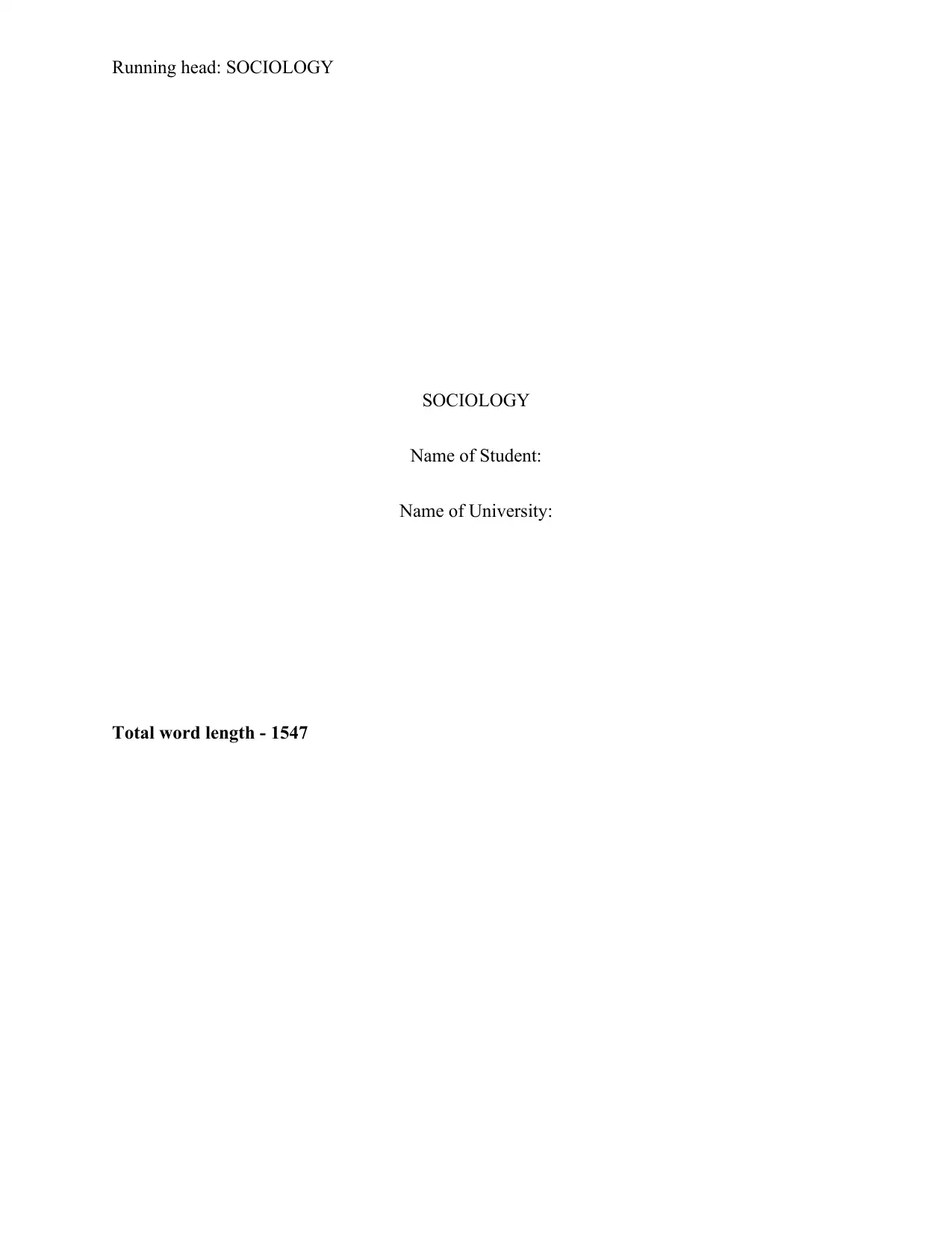
Running head: SOCIOLOGY
SOCIOLOGY
Name of Student:
Name of University:
Total word length - 1547
SOCIOLOGY
Name of Student:
Name of University:
Total word length - 1547
Paraphrase This Document
Need a fresh take? Get an instant paraphrase of this document with our AI Paraphraser
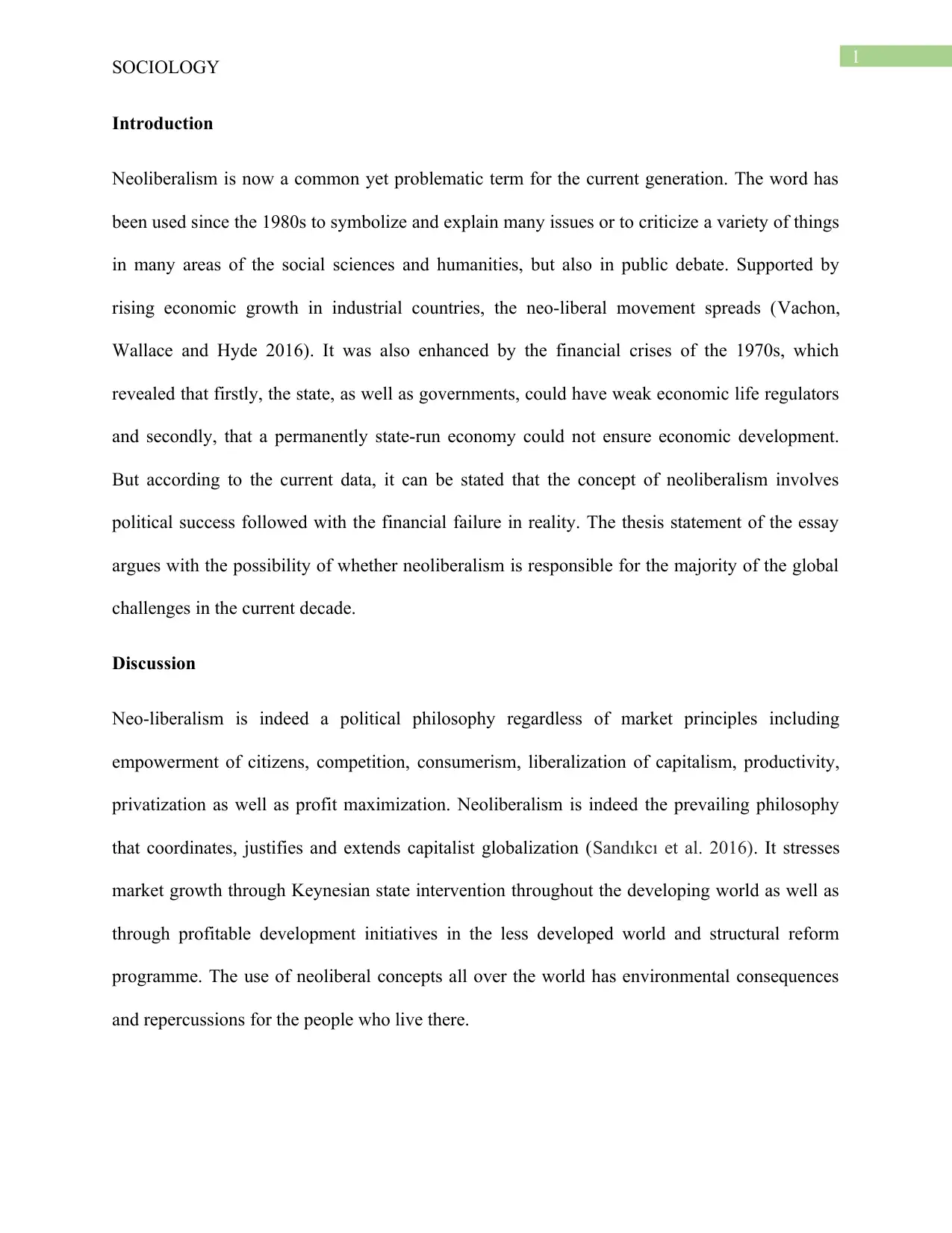
1
SOCIOLOGY
Introduction
Neoliberalism is now a common yet problematic term for the current generation. The word has
been used since the 1980s to symbolize and explain many issues or to criticize a variety of things
in many areas of the social sciences and humanities, but also in public debate. Supported by
rising economic growth in industrial countries, the neo-liberal movement spreads (Vachon,
Wallace and Hyde 2016). It was also enhanced by the financial crises of the 1970s, which
revealed that firstly, the state, as well as governments, could have weak economic life regulators
and secondly, that a permanently state-run economy could not ensure economic development.
But according to the current data, it can be stated that the concept of neoliberalism involves
political success followed with the financial failure in reality. The thesis statement of the essay
argues with the possibility of whether neoliberalism is responsible for the majority of the global
challenges in the current decade.
Discussion
Neo-liberalism is indeed a political philosophy regardless of market principles including
empowerment of citizens, competition, consumerism, liberalization of capitalism, productivity,
privatization as well as profit maximization. Neoliberalism is indeed the prevailing philosophy
that coordinates, justifies and extends capitalist globalization (Sandıkcı et al. 2016). It stresses
market growth through Keynesian state intervention throughout the developing world as well as
through profitable development initiatives in the less developed world and structural reform
programme. The use of neoliberal concepts all over the world has environmental consequences
and repercussions for the people who live there.
SOCIOLOGY
Introduction
Neoliberalism is now a common yet problematic term for the current generation. The word has
been used since the 1980s to symbolize and explain many issues or to criticize a variety of things
in many areas of the social sciences and humanities, but also in public debate. Supported by
rising economic growth in industrial countries, the neo-liberal movement spreads (Vachon,
Wallace and Hyde 2016). It was also enhanced by the financial crises of the 1970s, which
revealed that firstly, the state, as well as governments, could have weak economic life regulators
and secondly, that a permanently state-run economy could not ensure economic development.
But according to the current data, it can be stated that the concept of neoliberalism involves
political success followed with the financial failure in reality. The thesis statement of the essay
argues with the possibility of whether neoliberalism is responsible for the majority of the global
challenges in the current decade.
Discussion
Neo-liberalism is indeed a political philosophy regardless of market principles including
empowerment of citizens, competition, consumerism, liberalization of capitalism, productivity,
privatization as well as profit maximization. Neoliberalism is indeed the prevailing philosophy
that coordinates, justifies and extends capitalist globalization (Sandıkcı et al. 2016). It stresses
market growth through Keynesian state intervention throughout the developing world as well as
through profitable development initiatives in the less developed world and structural reform
programme. The use of neoliberal concepts all over the world has environmental consequences
and repercussions for the people who live there.
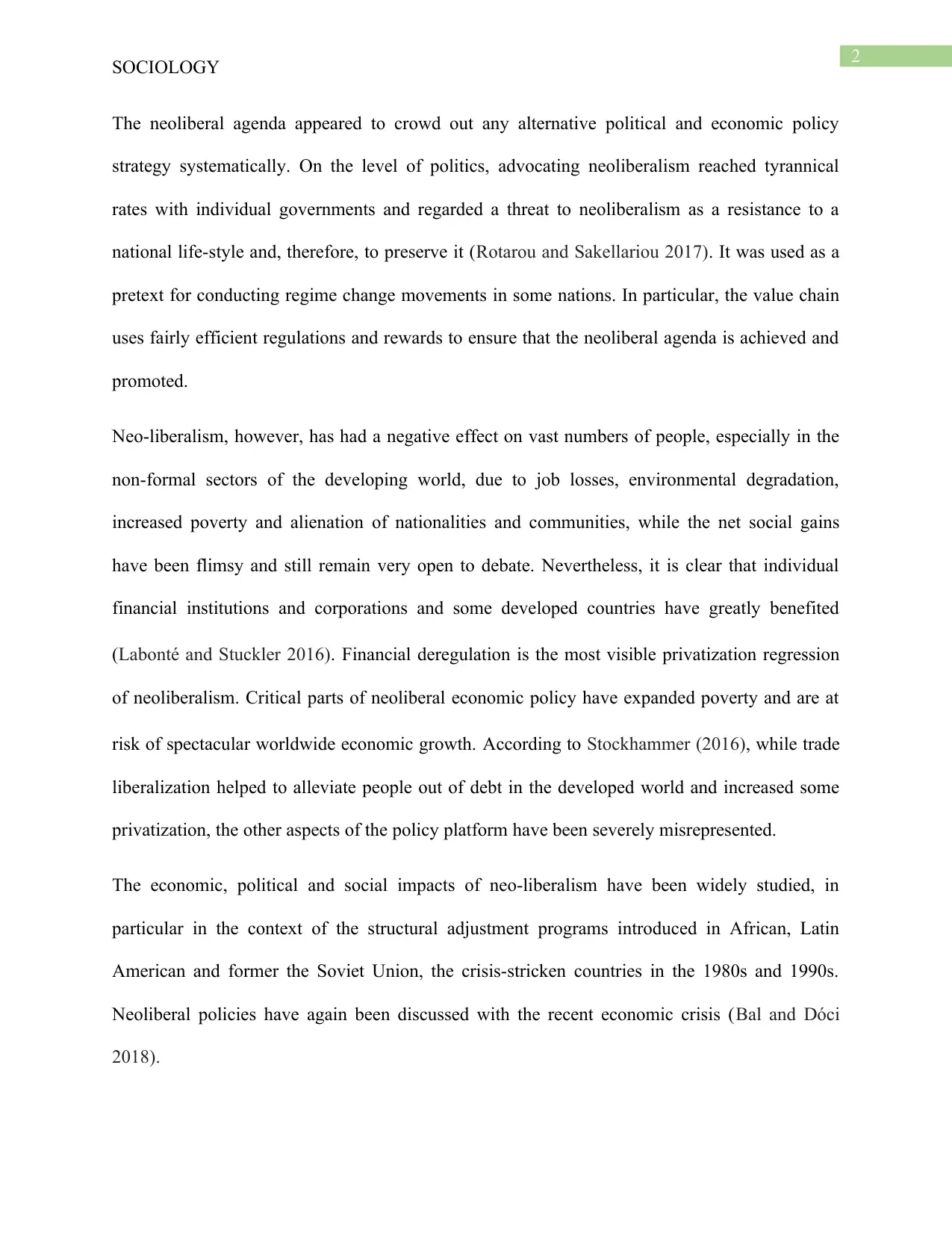
2
SOCIOLOGY
The neoliberal agenda appeared to crowd out any alternative political and economic policy
strategy systematically. On the level of politics, advocating neoliberalism reached tyrannical
rates with individual governments and regarded a threat to neoliberalism as a resistance to a
national life-style and, therefore, to preserve it (Rotarou and Sakellariou 2017). It was used as a
pretext for conducting regime change movements in some nations. In particular, the value chain
uses fairly efficient regulations and rewards to ensure that the neoliberal agenda is achieved and
promoted.
Neo-liberalism, however, has had a negative effect on vast numbers of people, especially in the
non-formal sectors of the developing world, due to job losses, environmental degradation,
increased poverty and alienation of nationalities and communities, while the net social gains
have been flimsy and still remain very open to debate. Nevertheless, it is clear that individual
financial institutions and corporations and some developed countries have greatly benefited
(Labonté and Stuckler 2016). Financial deregulation is the most visible privatization regression
of neoliberalism. Critical parts of neoliberal economic policy have expanded poverty and are at
risk of spectacular worldwide economic growth. According to Stockhammer (2016), while trade
liberalization helped to alleviate people out of debt in the developed world and increased some
privatization, the other aspects of the policy platform have been severely misrepresented.
The economic, political and social impacts of neo-liberalism have been widely studied, in
particular in the context of the structural adjustment programs introduced in African, Latin
American and former the Soviet Union, the crisis-stricken countries in the 1980s and 1990s.
Neoliberal policies have again been discussed with the recent economic crisis (Bal and Dóci
2018).
SOCIOLOGY
The neoliberal agenda appeared to crowd out any alternative political and economic policy
strategy systematically. On the level of politics, advocating neoliberalism reached tyrannical
rates with individual governments and regarded a threat to neoliberalism as a resistance to a
national life-style and, therefore, to preserve it (Rotarou and Sakellariou 2017). It was used as a
pretext for conducting regime change movements in some nations. In particular, the value chain
uses fairly efficient regulations and rewards to ensure that the neoliberal agenda is achieved and
promoted.
Neo-liberalism, however, has had a negative effect on vast numbers of people, especially in the
non-formal sectors of the developing world, due to job losses, environmental degradation,
increased poverty and alienation of nationalities and communities, while the net social gains
have been flimsy and still remain very open to debate. Nevertheless, it is clear that individual
financial institutions and corporations and some developed countries have greatly benefited
(Labonté and Stuckler 2016). Financial deregulation is the most visible privatization regression
of neoliberalism. Critical parts of neoliberal economic policy have expanded poverty and are at
risk of spectacular worldwide economic growth. According to Stockhammer (2016), while trade
liberalization helped to alleviate people out of debt in the developed world and increased some
privatization, the other aspects of the policy platform have been severely misrepresented.
The economic, political and social impacts of neo-liberalism have been widely studied, in
particular in the context of the structural adjustment programs introduced in African, Latin
American and former the Soviet Union, the crisis-stricken countries in the 1980s and 1990s.
Neoliberal policies have again been discussed with the recent economic crisis (Bal and Dóci
2018).
⊘ This is a preview!⊘
Do you want full access?
Subscribe today to unlock all pages.

Trusted by 1+ million students worldwide
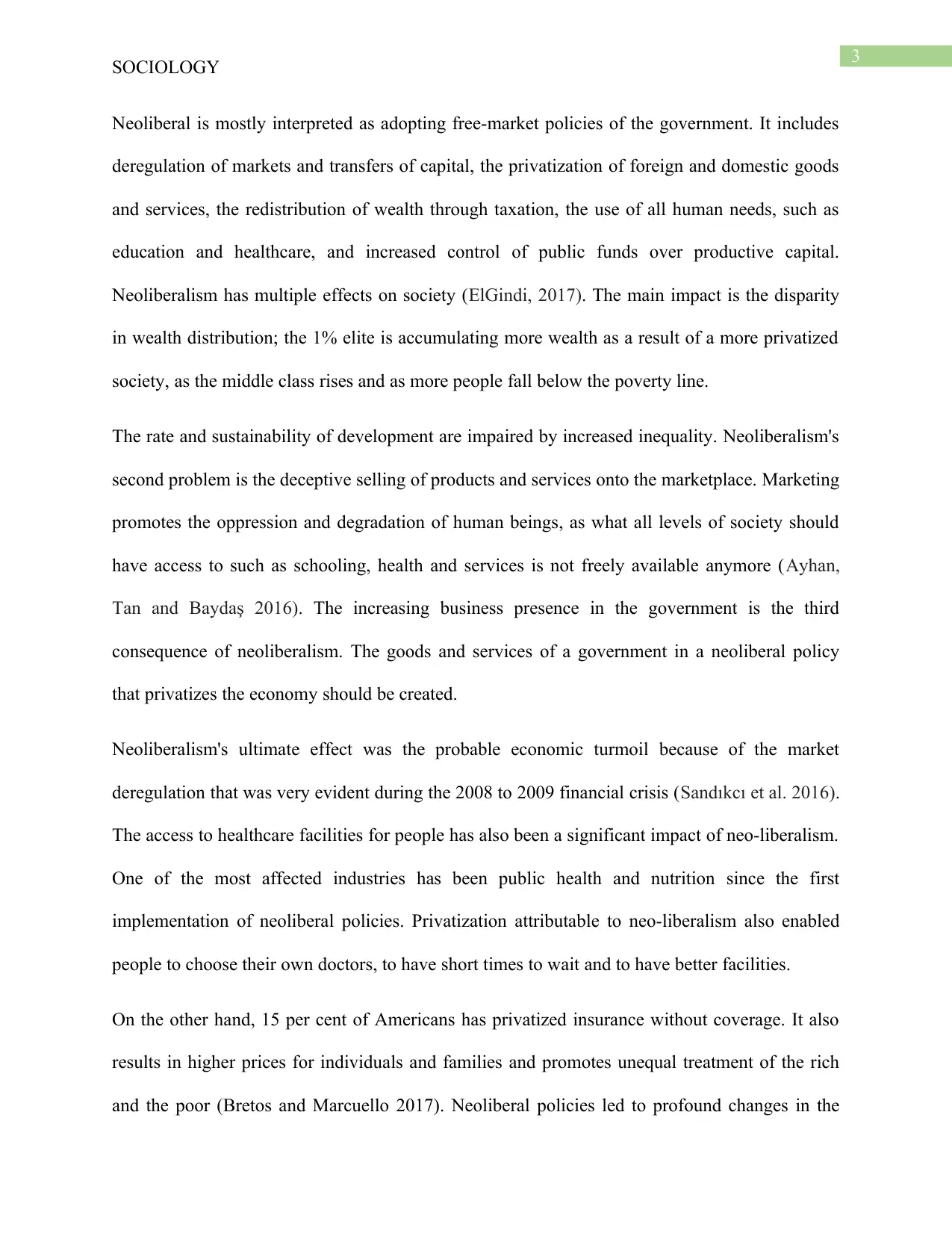
3
SOCIOLOGY
Neoliberal is mostly interpreted as adopting free-market policies of the government. It includes
deregulation of markets and transfers of capital, the privatization of foreign and domestic goods
and services, the redistribution of wealth through taxation, the use of all human needs, such as
education and healthcare, and increased control of public funds over productive capital.
Neoliberalism has multiple effects on society (ElGindi, 2017). The main impact is the disparity
in wealth distribution; the 1% elite is accumulating more wealth as a result of a more privatized
society, as the middle class rises and as more people fall below the poverty line.
The rate and sustainability of development are impaired by increased inequality. Neoliberalism's
second problem is the deceptive selling of products and services onto the marketplace. Marketing
promotes the oppression and degradation of human beings, as what all levels of society should
have access to such as schooling, health and services is not freely available anymore (Ayhan,
Tan and Baydaş 2016). The increasing business presence in the government is the third
consequence of neoliberalism. The goods and services of a government in a neoliberal policy
that privatizes the economy should be created.
Neoliberalism's ultimate effect was the probable economic turmoil because of the market
deregulation that was very evident during the 2008 to 2009 financial crisis (Sandıkcı et al. 2016).
The access to healthcare facilities for people has also been a significant impact of neo-liberalism.
One of the most affected industries has been public health and nutrition since the first
implementation of neoliberal policies. Privatization attributable to neo-liberalism also enabled
people to choose their own doctors, to have short times to wait and to have better facilities.
On the other hand, 15 per cent of Americans has privatized insurance without coverage. It also
results in higher prices for individuals and families and promotes unequal treatment of the rich
and the poor (Bretos and Marcuello 2017). Neoliberal policies led to profound changes in the
SOCIOLOGY
Neoliberal is mostly interpreted as adopting free-market policies of the government. It includes
deregulation of markets and transfers of capital, the privatization of foreign and domestic goods
and services, the redistribution of wealth through taxation, the use of all human needs, such as
education and healthcare, and increased control of public funds over productive capital.
Neoliberalism has multiple effects on society (ElGindi, 2017). The main impact is the disparity
in wealth distribution; the 1% elite is accumulating more wealth as a result of a more privatized
society, as the middle class rises and as more people fall below the poverty line.
The rate and sustainability of development are impaired by increased inequality. Neoliberalism's
second problem is the deceptive selling of products and services onto the marketplace. Marketing
promotes the oppression and degradation of human beings, as what all levels of society should
have access to such as schooling, health and services is not freely available anymore (Ayhan,
Tan and Baydaş 2016). The increasing business presence in the government is the third
consequence of neoliberalism. The goods and services of a government in a neoliberal policy
that privatizes the economy should be created.
Neoliberalism's ultimate effect was the probable economic turmoil because of the market
deregulation that was very evident during the 2008 to 2009 financial crisis (Sandıkcı et al. 2016).
The access to healthcare facilities for people has also been a significant impact of neo-liberalism.
One of the most affected industries has been public health and nutrition since the first
implementation of neoliberal policies. Privatization attributable to neo-liberalism also enabled
people to choose their own doctors, to have short times to wait and to have better facilities.
On the other hand, 15 per cent of Americans has privatized insurance without coverage. It also
results in higher prices for individuals and families and promotes unequal treatment of the rich
and the poor (Bretos and Marcuello 2017). Neoliberal policies led to profound changes in the
Paraphrase This Document
Need a fresh take? Get an instant paraphrase of this document with our AI Paraphraser
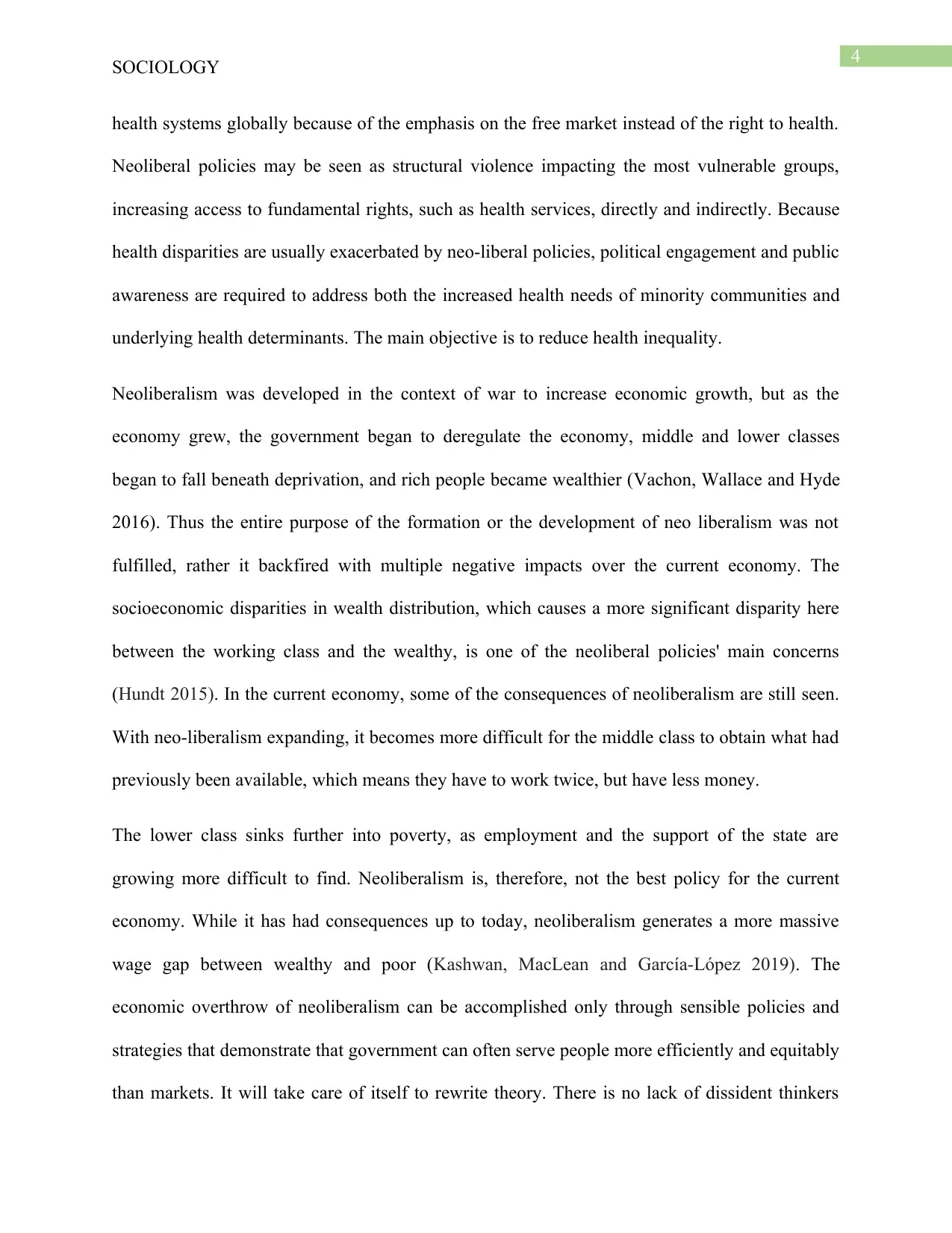
4
SOCIOLOGY
health systems globally because of the emphasis on the free market instead of the right to health.
Neoliberal policies may be seen as structural violence impacting the most vulnerable groups,
increasing access to fundamental rights, such as health services, directly and indirectly. Because
health disparities are usually exacerbated by neo-liberal policies, political engagement and public
awareness are required to address both the increased health needs of minority communities and
underlying health determinants. The main objective is to reduce health inequality.
Neoliberalism was developed in the context of war to increase economic growth, but as the
economy grew, the government began to deregulate the economy, middle and lower classes
began to fall beneath deprivation, and rich people became wealthier (Vachon, Wallace and Hyde
2016). Thus the entire purpose of the formation or the development of neo liberalism was not
fulfilled, rather it backfired with multiple negative impacts over the current economy. The
socioeconomic disparities in wealth distribution, which causes a more significant disparity here
between the working class and the wealthy, is one of the neoliberal policies' main concerns
(Hundt 2015). In the current economy, some of the consequences of neoliberalism are still seen.
With neo-liberalism expanding, it becomes more difficult for the middle class to obtain what had
previously been available, which means they have to work twice, but have less money.
The lower class sinks further into poverty, as employment and the support of the state are
growing more difficult to find. Neoliberalism is, therefore, not the best policy for the current
economy. While it has had consequences up to today, neoliberalism generates a more massive
wage gap between wealthy and poor (Kashwan, MacLean and García-López 2019). The
economic overthrow of neoliberalism can be accomplished only through sensible policies and
strategies that demonstrate that government can often serve people more efficiently and equitably
than markets. It will take care of itself to rewrite theory. There is no lack of dissident thinkers
SOCIOLOGY
health systems globally because of the emphasis on the free market instead of the right to health.
Neoliberal policies may be seen as structural violence impacting the most vulnerable groups,
increasing access to fundamental rights, such as health services, directly and indirectly. Because
health disparities are usually exacerbated by neo-liberal policies, political engagement and public
awareness are required to address both the increased health needs of minority communities and
underlying health determinants. The main objective is to reduce health inequality.
Neoliberalism was developed in the context of war to increase economic growth, but as the
economy grew, the government began to deregulate the economy, middle and lower classes
began to fall beneath deprivation, and rich people became wealthier (Vachon, Wallace and Hyde
2016). Thus the entire purpose of the formation or the development of neo liberalism was not
fulfilled, rather it backfired with multiple negative impacts over the current economy. The
socioeconomic disparities in wealth distribution, which causes a more significant disparity here
between the working class and the wealthy, is one of the neoliberal policies' main concerns
(Hundt 2015). In the current economy, some of the consequences of neoliberalism are still seen.
With neo-liberalism expanding, it becomes more difficult for the middle class to obtain what had
previously been available, which means they have to work twice, but have less money.
The lower class sinks further into poverty, as employment and the support of the state are
growing more difficult to find. Neoliberalism is, therefore, not the best policy for the current
economy. While it has had consequences up to today, neoliberalism generates a more massive
wage gap between wealthy and poor (Kashwan, MacLean and García-López 2019). The
economic overthrow of neoliberalism can be accomplished only through sensible policies and
strategies that demonstrate that government can often serve people more efficiently and equitably
than markets. It will take care of itself to rewrite theory. There is no lack of dissident thinkers
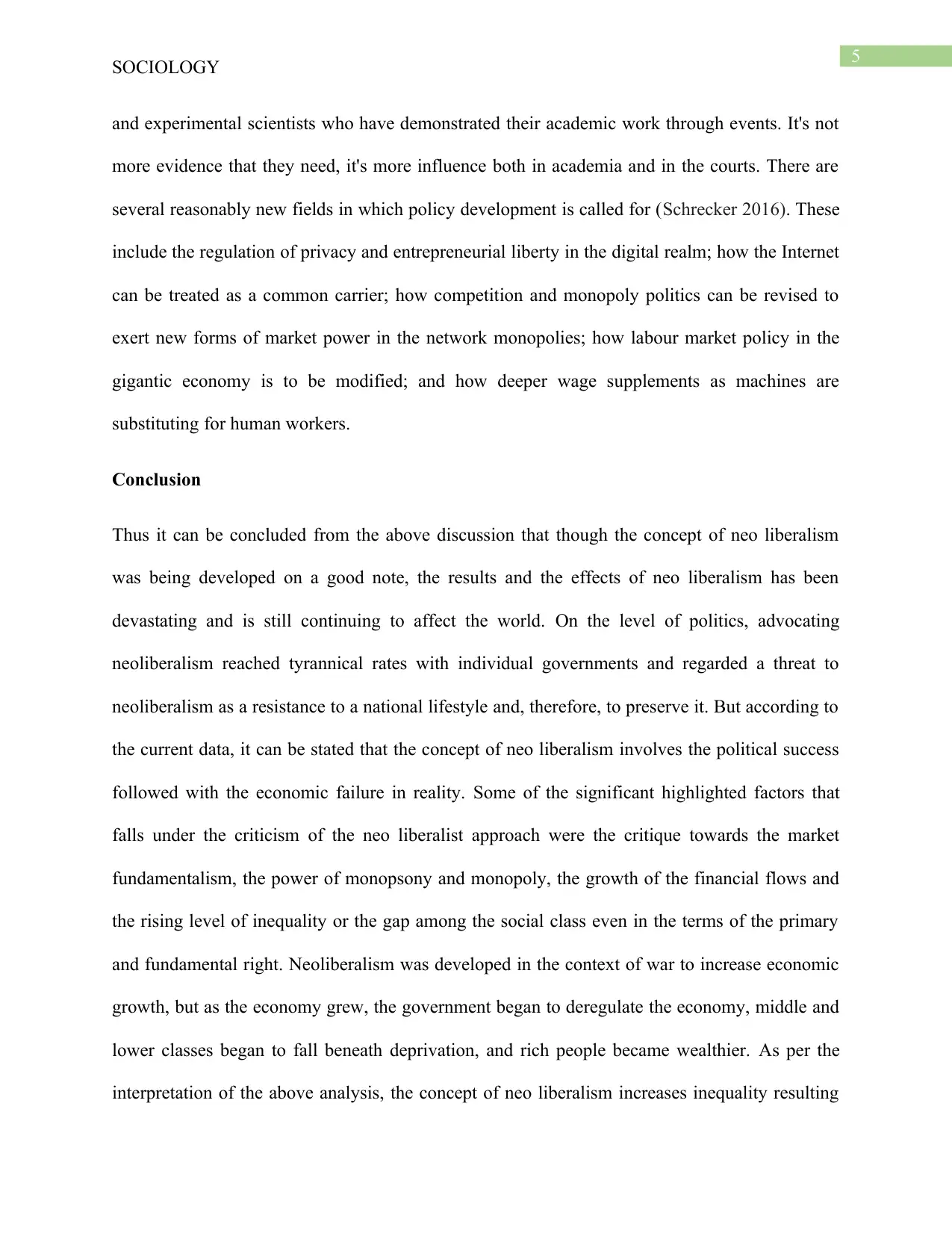
5
SOCIOLOGY
and experimental scientists who have demonstrated their academic work through events. It's not
more evidence that they need, it's more influence both in academia and in the courts. There are
several reasonably new fields in which policy development is called for (Schrecker 2016). These
include the regulation of privacy and entrepreneurial liberty in the digital realm; how the Internet
can be treated as a common carrier; how competition and monopoly politics can be revised to
exert new forms of market power in the network monopolies; how labour market policy in the
gigantic economy is to be modified; and how deeper wage supplements as machines are
substituting for human workers.
Conclusion
Thus it can be concluded from the above discussion that though the concept of neo liberalism
was being developed on a good note, the results and the effects of neo liberalism has been
devastating and is still continuing to affect the world. On the level of politics, advocating
neoliberalism reached tyrannical rates with individual governments and regarded a threat to
neoliberalism as a resistance to a national lifestyle and, therefore, to preserve it. But according to
the current data, it can be stated that the concept of neo liberalism involves the political success
followed with the economic failure in reality. Some of the significant highlighted factors that
falls under the criticism of the neo liberalist approach were the critique towards the market
fundamentalism, the power of monopsony and monopoly, the growth of the financial flows and
the rising level of inequality or the gap among the social class even in the terms of the primary
and fundamental right. Neoliberalism was developed in the context of war to increase economic
growth, but as the economy grew, the government began to deregulate the economy, middle and
lower classes began to fall beneath deprivation, and rich people became wealthier. As per the
interpretation of the above analysis, the concept of neo liberalism increases inequality resulting
SOCIOLOGY
and experimental scientists who have demonstrated their academic work through events. It's not
more evidence that they need, it's more influence both in academia and in the courts. There are
several reasonably new fields in which policy development is called for (Schrecker 2016). These
include the regulation of privacy and entrepreneurial liberty in the digital realm; how the Internet
can be treated as a common carrier; how competition and monopoly politics can be revised to
exert new forms of market power in the network monopolies; how labour market policy in the
gigantic economy is to be modified; and how deeper wage supplements as machines are
substituting for human workers.
Conclusion
Thus it can be concluded from the above discussion that though the concept of neo liberalism
was being developed on a good note, the results and the effects of neo liberalism has been
devastating and is still continuing to affect the world. On the level of politics, advocating
neoliberalism reached tyrannical rates with individual governments and regarded a threat to
neoliberalism as a resistance to a national lifestyle and, therefore, to preserve it. But according to
the current data, it can be stated that the concept of neo liberalism involves the political success
followed with the economic failure in reality. Some of the significant highlighted factors that
falls under the criticism of the neo liberalist approach were the critique towards the market
fundamentalism, the power of monopsony and monopoly, the growth of the financial flows and
the rising level of inequality or the gap among the social class even in the terms of the primary
and fundamental right. Neoliberalism was developed in the context of war to increase economic
growth, but as the economy grew, the government began to deregulate the economy, middle and
lower classes began to fall beneath deprivation, and rich people became wealthier. As per the
interpretation of the above analysis, the concept of neo liberalism increases inequality resulting
⊘ This is a preview!⊘
Do you want full access?
Subscribe today to unlock all pages.

Trusted by 1+ million students worldwide
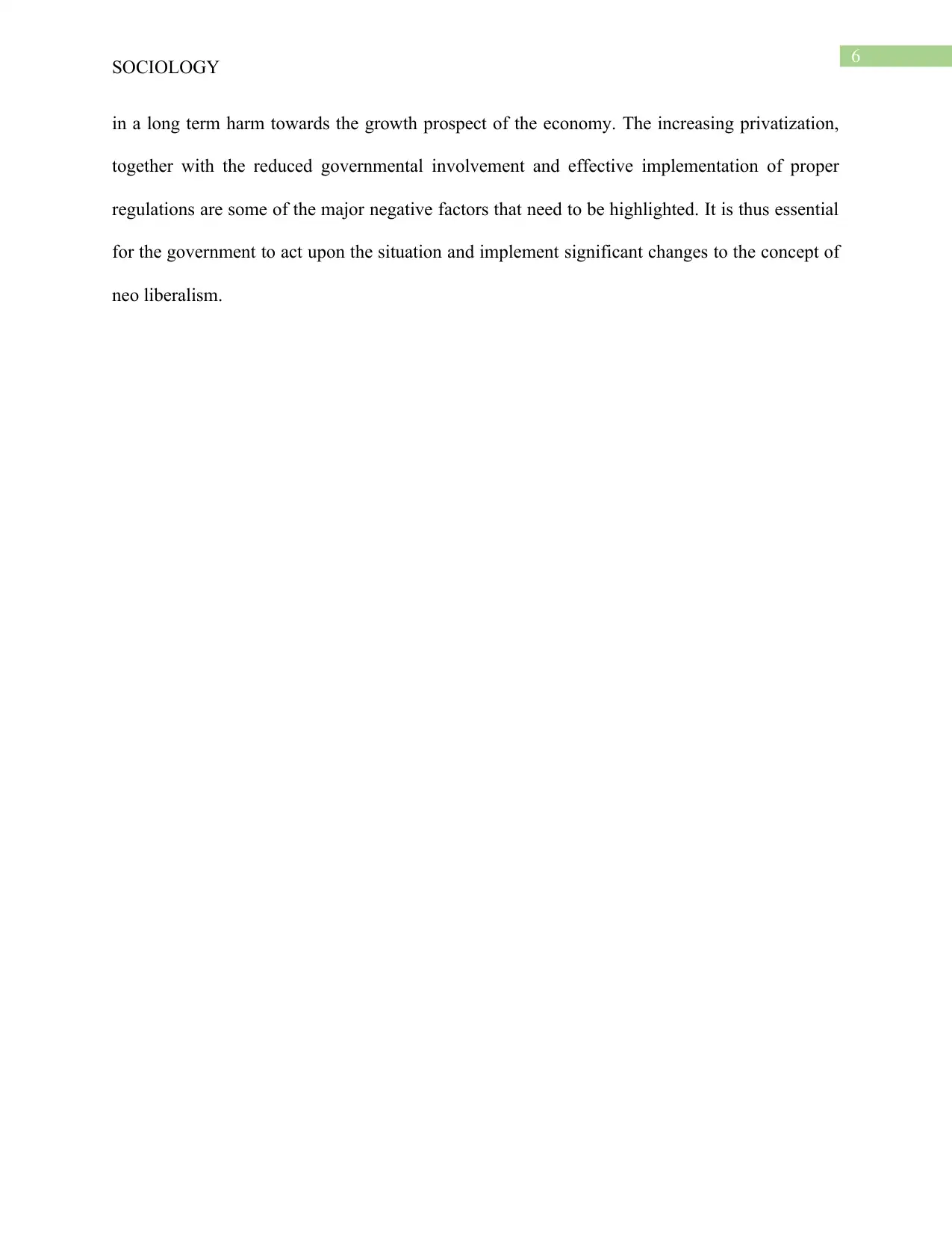
6
SOCIOLOGY
in a long term harm towards the growth prospect of the economy. The increasing privatization,
together with the reduced governmental involvement and effective implementation of proper
regulations are some of the major negative factors that need to be highlighted. It is thus essential
for the government to act upon the situation and implement significant changes to the concept of
neo liberalism.
SOCIOLOGY
in a long term harm towards the growth prospect of the economy. The increasing privatization,
together with the reduced governmental involvement and effective implementation of proper
regulations are some of the major negative factors that need to be highlighted. It is thus essential
for the government to act upon the situation and implement significant changes to the concept of
neo liberalism.
Paraphrase This Document
Need a fresh take? Get an instant paraphrase of this document with our AI Paraphraser
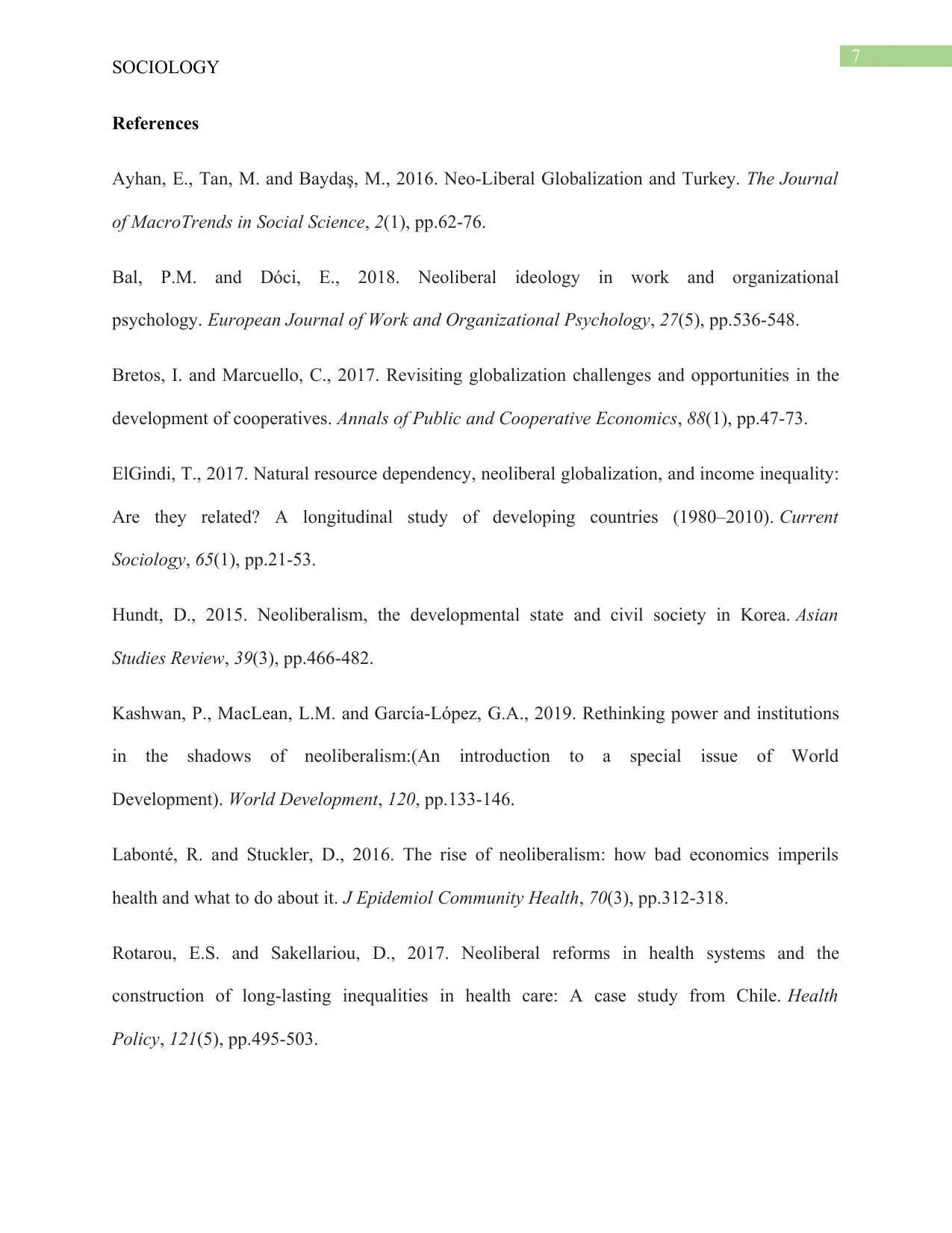
7
SOCIOLOGY
References
Ayhan, E., Tan, M. and Baydaş, M., 2016. Neo-Liberal Globalization and Turkey. The Journal
of MacroTrends in Social Science, 2(1), pp.62-76.
Bal, P.M. and Dóci, E., 2018. Neoliberal ideology in work and organizational
psychology. European Journal of Work and Organizational Psychology, 27(5), pp.536-548.
Bretos, I. and Marcuello, C., 2017. Revisiting globalization challenges and opportunities in the
development of cooperatives. Annals of Public and Cooperative Economics, 88(1), pp.47-73.
ElGindi, T., 2017. Natural resource dependency, neoliberal globalization, and income inequality:
Are they related? A longitudinal study of developing countries (1980–2010). Current
Sociology, 65(1), pp.21-53.
Hundt, D., 2015. Neoliberalism, the developmental state and civil society in Korea. Asian
Studies Review, 39(3), pp.466-482.
Kashwan, P., MacLean, L.M. and García-López, G.A., 2019. Rethinking power and institutions
in the shadows of neoliberalism:(An introduction to a special issue of World
Development). World Development, 120, pp.133-146.
Labonté, R. and Stuckler, D., 2016. The rise of neoliberalism: how bad economics imperils
health and what to do about it. J Epidemiol Community Health, 70(3), pp.312-318.
Rotarou, E.S. and Sakellariou, D., 2017. Neoliberal reforms in health systems and the
construction of long-lasting inequalities in health care: A case study from Chile. Health
Policy, 121(5), pp.495-503.
SOCIOLOGY
References
Ayhan, E., Tan, M. and Baydaş, M., 2016. Neo-Liberal Globalization and Turkey. The Journal
of MacroTrends in Social Science, 2(1), pp.62-76.
Bal, P.M. and Dóci, E., 2018. Neoliberal ideology in work and organizational
psychology. European Journal of Work and Organizational Psychology, 27(5), pp.536-548.
Bretos, I. and Marcuello, C., 2017. Revisiting globalization challenges and opportunities in the
development of cooperatives. Annals of Public and Cooperative Economics, 88(1), pp.47-73.
ElGindi, T., 2017. Natural resource dependency, neoliberal globalization, and income inequality:
Are they related? A longitudinal study of developing countries (1980–2010). Current
Sociology, 65(1), pp.21-53.
Hundt, D., 2015. Neoliberalism, the developmental state and civil society in Korea. Asian
Studies Review, 39(3), pp.466-482.
Kashwan, P., MacLean, L.M. and García-López, G.A., 2019. Rethinking power and institutions
in the shadows of neoliberalism:(An introduction to a special issue of World
Development). World Development, 120, pp.133-146.
Labonté, R. and Stuckler, D., 2016. The rise of neoliberalism: how bad economics imperils
health and what to do about it. J Epidemiol Community Health, 70(3), pp.312-318.
Rotarou, E.S. and Sakellariou, D., 2017. Neoliberal reforms in health systems and the
construction of long-lasting inequalities in health care: A case study from Chile. Health
Policy, 121(5), pp.495-503.
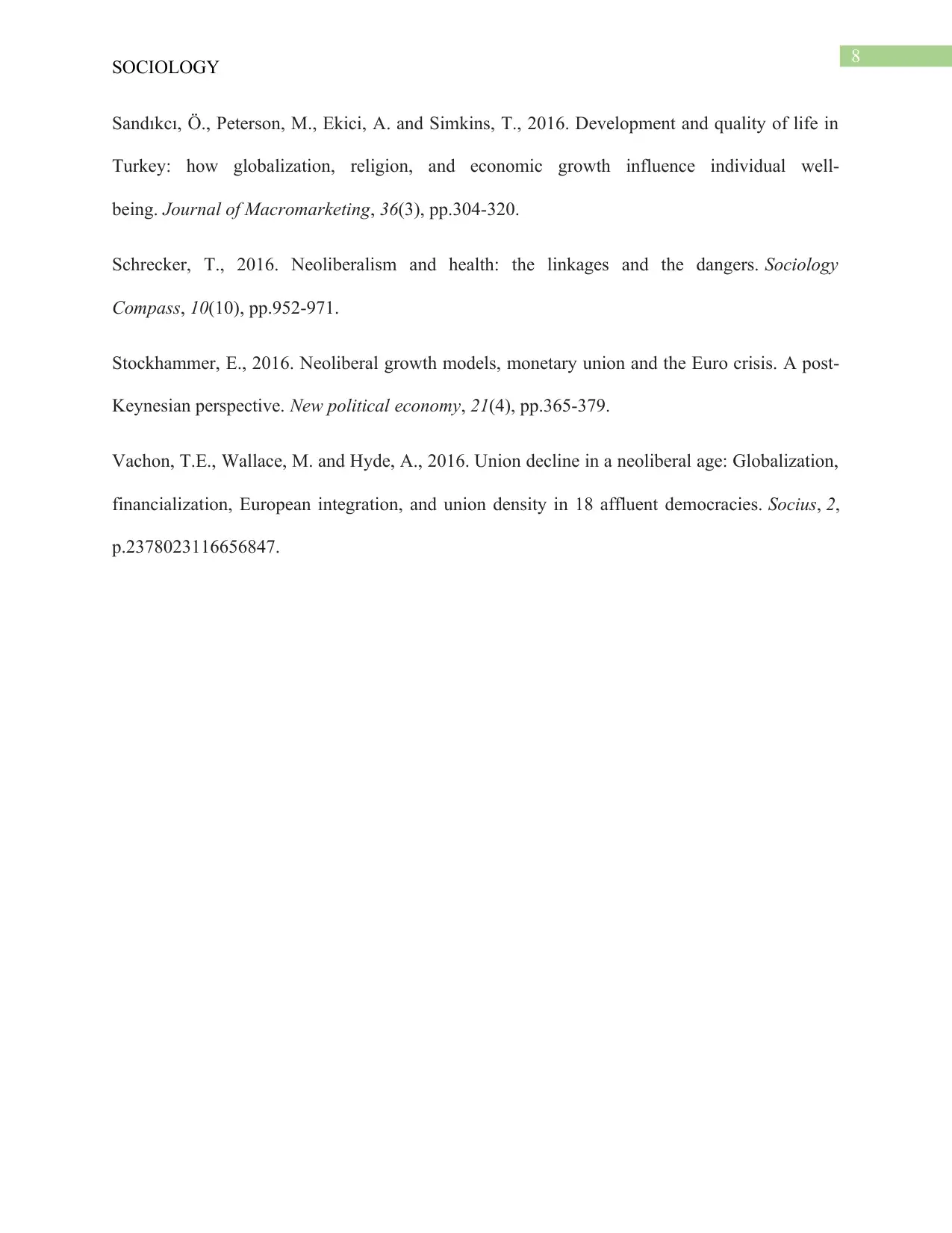
8
SOCIOLOGY
Sandıkcı, Ö., Peterson, M., Ekici, A. and Simkins, T., 2016. Development and quality of life in
Turkey: how globalization, religion, and economic growth influence individual well-
being. Journal of Macromarketing, 36(3), pp.304-320.
Schrecker, T., 2016. Neoliberalism and health: the linkages and the dangers. Sociology
Compass, 10(10), pp.952-971.
Stockhammer, E., 2016. Neoliberal growth models, monetary union and the Euro crisis. A post-
Keynesian perspective. New political economy, 21(4), pp.365-379.
Vachon, T.E., Wallace, M. and Hyde, A., 2016. Union decline in a neoliberal age: Globalization,
financialization, European integration, and union density in 18 affluent democracies. Socius, 2,
p.2378023116656847.
SOCIOLOGY
Sandıkcı, Ö., Peterson, M., Ekici, A. and Simkins, T., 2016. Development and quality of life in
Turkey: how globalization, religion, and economic growth influence individual well-
being. Journal of Macromarketing, 36(3), pp.304-320.
Schrecker, T., 2016. Neoliberalism and health: the linkages and the dangers. Sociology
Compass, 10(10), pp.952-971.
Stockhammer, E., 2016. Neoliberal growth models, monetary union and the Euro crisis. A post-
Keynesian perspective. New political economy, 21(4), pp.365-379.
Vachon, T.E., Wallace, M. and Hyde, A., 2016. Union decline in a neoliberal age: Globalization,
financialization, European integration, and union density in 18 affluent democracies. Socius, 2,
p.2378023116656847.
⊘ This is a preview!⊘
Do you want full access?
Subscribe today to unlock all pages.

Trusted by 1+ million students worldwide
1 out of 9
Related Documents
Your All-in-One AI-Powered Toolkit for Academic Success.
+13062052269
info@desklib.com
Available 24*7 on WhatsApp / Email
![[object Object]](/_next/static/media/star-bottom.7253800d.svg)
Unlock your academic potential
Copyright © 2020–2026 A2Z Services. All Rights Reserved. Developed and managed by ZUCOL.





